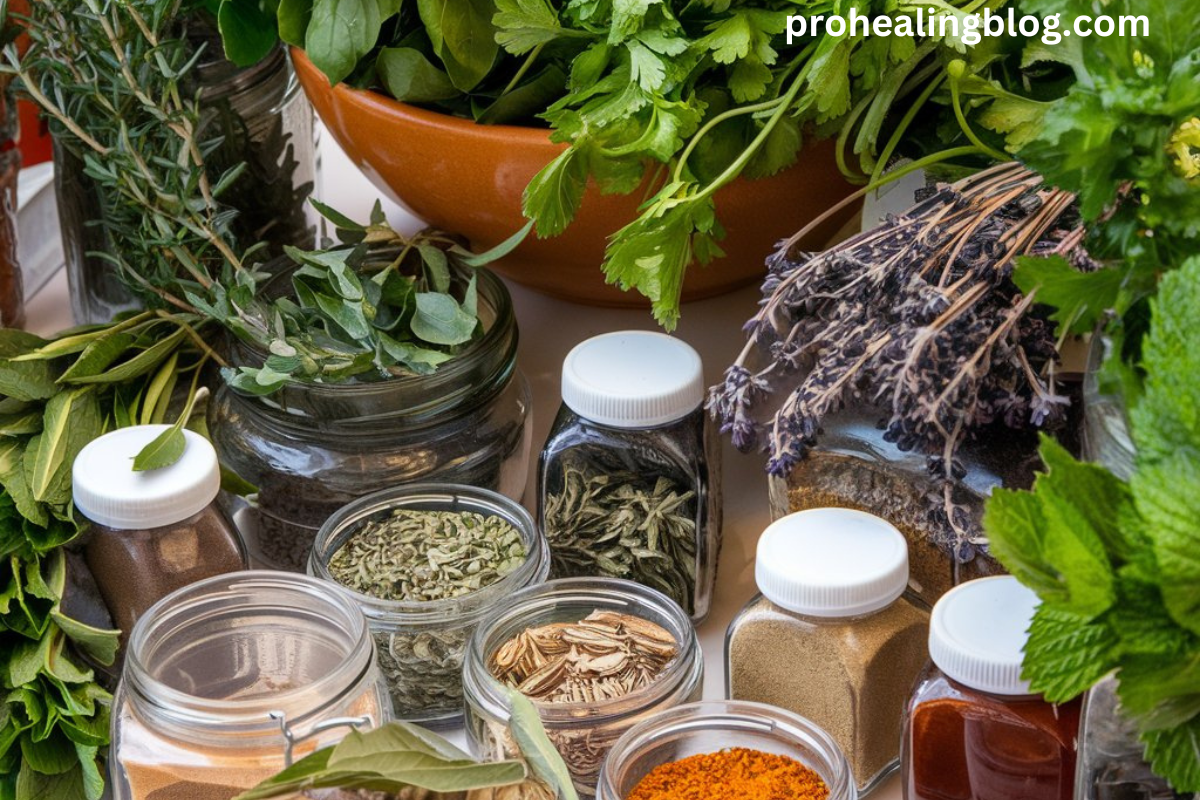Plants have been used for centuries as natural remedies for various ailments. From boosting immunity to soothing digestion, healing herbs and medicinal plants play a vital role in supporting health and wellness. In this comprehensive guide, we will dive into a healing herbs and medicinal plants list, their uses, and how you can incorporate them into your daily life.
What Are Healing Herbs and Medicinal Plants?
Healing herbs are plants that people use for their therapeutic properties, especially to treat common ailments. Similarly, medicinal plants refer to any plant used for medicinal purposes, whether for their leaves, flowers, roots, or seeds. These plants are widely used in traditional medicine and have also been studied for their health benefits in modern times.
See also: Healing Herbs and Medicinal Plants List: Nature’s Remedies
Why Use Healing Herbs and Medicinal Plants?
Healing herbs and medicinal plants offer a natural alternative to synthetic medications. They are rich in vitamins, minerals, antioxidants, and other compounds that can improve health, enhance the immune system, and promote overall well-being. Many of these herbs are easy to grow in your own garden or can be found in local health food stores.
A List of Popular Healing Herbs and Medicinal Plants
Here is a list of some of the most effective and widely used healing herbs and medicinal plants, along with their benefits and ways you can incorporate them into your daily routine
1. Echinacea
Echinacea (Echinacea purpurea) is one of the most popular medicinal plants, known for its ability to boost the immune system. It is commonly used to prevent or reduce the severity of colds and respiratory infections. You can consume echinacea as a tea or in supplement form.
2. Ginger
Ginger (Zingiber officinale) is widely recognized for its digestive benefits. It relieves nausea, improves circulation, and reduces inflammation. You can add fresh ginger to teas or smoothies, and you can also take ginger supplements to support digestion and overall health.
3. Turmeric
Turmeric (Curcuma longa) contains curcumin, a powerful anti-inflammatory compound. It has treated conditions like arthritis, digestive issues, and skin irritations for centuries. You can consume it in cooking, take it as a supplement, or even drink turmeric tea for its health benefits.
4. Peppermint
Peppermint (Mentha piperita) is an excellent herb for soothing digestive problems such as bloating, indigestion, and nausea. It has a cooling effect and can be used as a tea or essential oil to promote relaxation and relieve headaches.
5. Lavender
Lavender (Lavandula angustifolia) is well known for its calming properties. It helps reduce stress, alleviate anxiety, and promote restful sleep. You can use lavender oil in aromatherapy, and lavender tea serves as a gentle, natural sleep aid.
6. Chamomile
Chamomile (Matricaria chamomilla) is another calming herb often used to treat anxiety and insomnia. The tea is widely used to soothe the stomach, calm the mind, and promote sleep. It also has anti-inflammatory and mild sedative effects.
7. Garlic
8. Aloe Vera
Aloe vera (Aloe barbadensis miller) is a well-known plant that people use for skin health. Its gel soothes burns, cuts, and other skin irritations. Additionally, you can consume aloe vera as a juice to promote digestive health and detoxify the body.
9. Holy Basil (Tulsi)
Holy basil (Ocimum sanctum), or Tulsi, is a revered herb in Ayurvedic medicine. Tulsi is known for reducing stress, enhancing immunity, and promoting mental clarity. You can consume it as a tea or supplement to support overall health and maintain balance.
10. St. John’s Wort
People often use St. John’s Wort (Hypericum perforatum) to manage mild to moderate depression It has mood-boosting properties and can help with anxiety and insomnia. It is commonly consumed as a tea or in supplement form.
11. Milk Thistle
Milk thistle (Silybum marianum) is often used for liver health. It contains silymarin, a powerful antioxidant that helps detoxify the liver and protect it from damage. You can find milk thistle in supplement form or as a tea.
12. Ashwagandha
13. Ginseng
Ginseng (Panax ginseng) is a popular herb that increases energy, improves cognitive function, and enhances physical endurance. Additionally, it is known for its stress-reducing properties. You can consume ginseng as a tea, capsule, or powder to enjoy its benefits.
14. Dandelion
Additionally, dandelion leaves help promote digestion and contribute to healthy skin. Moreover, dandelion leaves aid digestion and promote healthy skin.
15. Fennel
Fennel (Foeniculum vulgare) is an herb that aids digestion and relieves bloatingPeople commonly use its seeds in teas and cooking to ease gastrointestinal discomfort. Additionally, fennel has mild antioxidant properties and helps promote hormonal balance in women.
How to Use Herbs and Plants for Better Health
You can use healing herbs and medicinal plants in various forms:
- Teas: Most herbs can be steeped in hot water to make calming and medicinal teas.
- Tinctures: Alcohol-based extracts of herbs that are potent and easy to carry.
- Essential Oils: Used in aromatherapy or for topical application.
- Supplements: Many herbs are available in capsule or tablet form for easy consumption.
- Topical Applications: Some herbs, like aloe vera and lavender, can be applied directly to the skin.
It’s important to consult a healthcare professional before using any medicinal plant, especially if you are pregnant, nursing, or on medication.
Growing Your Own Medicinal Plants
Many healing herbs and medicinal plants are easy to grow at home. Here are a few tips:
- Basil, mint, and rosemary thrive in sunny spots with well-drained soil.
- Lavender prefers a dry, sunny location.
- Ginger and turmeric They need warm, humid environments and can thrive indoors in containers if you live in a cooler climate.
Growing your own medicinal plants ensures you have fresh, natural remedies right at your fingertips.
Conclusion: Harness the Power of Healing Herbs and Medicinal Plants
The world of healing herbs and medicinal plants is vast and offers a natural alternative to pharmaceutical treatments. From boosting immunity to calming anxiety, these plants provide a wide range of health benefits. By incorporating them into your daily routine, you can enhance your overall well-being and embrace the power of nature’s remedies. Whether you grow them at home or purchase them from a store, these medicinal plants are easy to use and offer endless possibilities for improving your health.
See also: Dairy for Preschoolers: Benefits, Best Choices, and Daily Intake Guidelines






